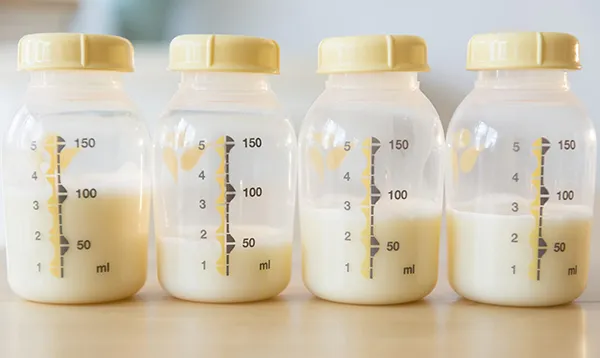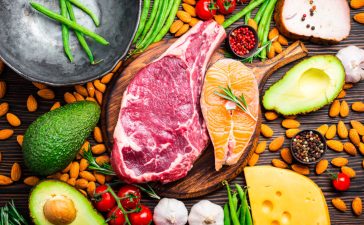Breastfeeding is the most beautiful, natural way to connect with your baby and nourish it. But what do you do when your breastmilk doesn’t taste quite right?
Have you noticed your stored milk has an unpleasant taste or smell? If yes, you are dealing with high lipase milk. We know this can be alarming for new parents, particularly breastfeeding moms.
In today’s blog, we’ll help you understand what is high lipase breastmilk, its effects, and what you can do about it.
Understanding Lipase
What is Lipase?
Lipase is an enzyme found naturally in breast milk. Its primary function is to break down fats into glycerol and fatty acids, and in that way makes it easier for your baby to digest milk. In other words, it’s crucial in helping your baby absorb essential nutrients from your milk.
Typically it’s not a problem if you have high lipase levels because they improve your breastmilk’s nutritional quality. However, problems can occur when this enzyme’s activity becomes excessive, leading to a change in the milk’s smell and taste.
The Role of Lipase in Breastmilk
As we said, lipase’s primary role is to ensure that the fats in breast milk are effectively absorbed by your baby’s developing digestive system. This is really important, since fats are vital to your baby’s diet. They support brain development and provide the necessary energy for your baby’s growth.
It’s important to say that not all mothers will experience issues with high lipase activity. However, for some, this can lead to significant problems.
Why Lipase is Important
To alleviate concerns you might have, it’s important to understand the importance of lipase. While lipase can cause some challenges, it also benefits for your baby’s growth and development. Knowing this can help you approach the matter with a balanced mindset.
The Effect of High Lipase Milk
First Signs
How can you recognize high lipase in brestmilk? One of the most common signs is a metallic or soapy smell and taste of the milk that’s been stored. This happens after only a few hours to a day in the fridge or freezer.
However, this milk is safe to consume, but some babies could refuse it because of the strange taste.
You will first notice this issue when your baby rejects refrigerated or frozen milk. We understand this can be really stressful for new parents because pumping and storing milk requires a lot of effort and time. However, it’s manageable.
Impact on Baby’s Feeding
The taste of high lipase milk can make feeding time difficult for newborn moms. Some babies are sensitive to the taste change, so they might refuse to drink it, leading to other worries about your baby’s diet and nutrition.
However, it’s important to know that not all babies will refuse high lipase milk. Some will not even notice the difference at all. It’s best to observe your baby’s reactions so you will know if you have an issue with this matter.
Emotional Toll on Mothers
Dealing with this problem can be mentally exhausting for new mothers. The process of pumping and storing milk is already demanding by itself. On top of that, the discovery that your baby is refusing stored milk can only enhance these emotions. However, don’t be discouraged. Remember that this issue is common and manageable.
Understanding the Causes of High Lipase Milk
Why Do I Have High Lipase Milk?
What causes high lipase in milk? The exact cause is not clear. Some women naturally have higher lipase levels in their milk, unrelated to their health, diet, or other factors.
Genetics can also play a significant role in this matter. It’s a complex issue, but more research is being done every day to fully understand the reasons.
Factors Influencing Lipase Levels
As mentioned, the causes of high lipase levels are still unclear, yet it’s essential to know that some factors can influence enzyme activity. These include stress levels, hormonal changes, and overall health. However, this doesn’t mean that these factors will have a predictable impact on lipase levels.
Your focus should be on managing the effects instead of worrying about the uncontrollable causes.
Is High Lipase Harmful?
High lipase milk is not harmful to your baby. Moreover, lipase actually has many benefits and helps with fat absorption and digestion. Really, the only issue is the taste change, which can cause you feeding problems if your baby refuses to drink it.
Rest assured, while the taste is slightly different, this milk still retains its nutritional value and is safe for consumption.
How to Treat High Lipase Milk
Scalding Milk to Inactivate Lipase
Scalding is a reliable method for managing high lipase milk. How to scald milk? Basically, you should heat the milk to inactivate the lipase in it before storing it in the fridge or freezer. Heating milk will preserve the taste and quality, preventing your baby from rejecting it.
Here are the steps: Heat the milk in a pot until tiny bubbles form (approximately 180°F), then cool it quickly before freezing or refrigerating.
This will preserve the milk’s taste, making it more acceptable to your baby. However, this process might reduce some of the beneficial effects of your breastmilk, so you should do it carefully.
Freezing Milk
Another way to manage high lipase milk is to freeze it immediately after pumping. This will help slow down the activity of lipase and potentially even prevent taste changes. The faster you freeze milk, the higher the chance it will keep its original taste. Try using small storage containers to freeze milk faster.
This method will not eliminate the issue, but it can minimize the chances of the taste change.
Mixing Fresh and Stored Milk
Another great strategy to handle this matter is mixing freshly pumped milk with previously stored high lipase milk. Combining these two might help hide the taste changes, so there’s a higher chance your baby won’t refuse it. Start with small doses and gradually increase the proportion of stored milk.
Conclusion
High lipase milk can be frustrating and challenging for newborn moms; however, there’s no need to worry, it’s manageable with the proper methods.
Understanding how to treat it will ensure your baby gets the best nutrition. Try one of these methods, such as scalding your milk, freezing it, or mixing fresh milk with the stored one. We hope this guide will make your breastfeeding journey as smooth and fulfilling as possible!
Remember, you’re not alone in this! Many mothers are dealing with high lipase milk and have found successful ways to address it.





